
by World Moms Blog | May 27, 2015 | 2015, Africa, Feminism, Inspirational, Lesotho, Uncategorized, Work
 I grew up in a family full of dynamic, resourceful, and strong women. My grandmothers were both widowed and had to raise their children (one had 6 children, the other 9) with nothing but agricultural produce and handcrafts. My mother and aunts displayed the same tenacity in their lives, and I witnessed similar characteristics in other women in my neighborhood and social circles.
I grew up in a family full of dynamic, resourceful, and strong women. My grandmothers were both widowed and had to raise their children (one had 6 children, the other 9) with nothing but agricultural produce and handcrafts. My mother and aunts displayed the same tenacity in their lives, and I witnessed similar characteristics in other women in my neighborhood and social circles.
This sparked a debate in me. I was baffled: “With such a healthy heritage of Basotho women, why do we have so few in leadership?”
My personal search for an answer to this question led me to explore avenues commonly considered to be reserved for men. I wanted to be a medical doctor like my father and grandfather, which led to me compete with my male counterparts from primary school through to university. I managed to earn a number of over-achiever certificates, but my dream of being a medical doctor did not materialize. I ended up with a Bachelor of Science degree with a double major in biochemistry and psychology.
After graduation, I entered the telecommunications field. I soon learned that the corporate world, like school, tended to reserve certain roles for men–including most senior offices, despite the high level of educated women in our country. Of course, this is not unique to Lesotho, but a global phenomenon.
Perhaps not surprisingly, there is a gender gap in mobile phone ownership in developing countries as well. (Men own more of them.) When I was presented with a project to reduce the mobile phone gender gap, I ran with it! With the eradication of the mobile gender gap, women will be enabled to participate in the global economy while improving their livelihoods.
The project focuses on women working for the company, women in the community, and the company’s female clients. Internally, a network of women was formed in order to inspire leadership, achievement and accountability among women. The Sisters’ Circle meets monthly and holds quarterly workshops to work towards this.
Externally, I am very excited about the creation of an internship program. Our goal is to give female graduates work experience, build a talent pool for the company, and help to bridge the skills gender gap that might otherwise hold these women back.
I wish to see more, if not all, major employers in the country adopt a similar projects so that our women believe in themselves and realize that that they have what it takes to lead organizations and governments. Ideally, empowering females should start in the classroom, so our daughters know and believe that they are equally able as our sons to become doctors, telecommunications executives, or whatever their heart and head desire.
What does your place of work do to empower women?
This is an original post to World Mom Blog by guest writer Mho Mosotho in Lesotho. She is a colleague of WMB contributor Dee Harlow.
Photo credit to the author.
World Moms Blog is an award winning website which writes from over 30 countries on the topics of motherhood, culture, human rights and social good. Over 70 international contributors share their stories from around the globe, bonded by the common thread of motherhood and wanting a better world for their children.
World Moms Blog was listed by Forbes Woman as one of the "Best 100 Websites for Women 2012 & 2013" and also called a "must read" by the NY Times Motherlode in 2013. Our Senior Editor in India, Purnima Ramakrishnan, was awarded the BlogHer International Activist Award in 2013.
More Posts

by World Moms Blog | Apr 1, 2015 | Feminism, Girls, Gratefulness, Guest Post, Human Rights, Husband, Priorities, School, Social Equality, Uncategorized, Women's Rights, Working Mother
 Kids complain about going to school today? Have them read this guest post, which comes to us from Ibtisam in Oman. You can find more of her wonderful perspective on her blog: ibtisammusings.com.
Kids complain about going to school today? Have them read this guest post, which comes to us from Ibtisam in Oman. You can find more of her wonderful perspective on her blog: ibtisammusings.com.
Sometime in the late 1960s, there was a six-year-old girl whose father did not believe education was of any benefit to her. However, because her eldest brother took a stand that education was her right, she went to school and was quite intelligent in her studies. She did not make it to high school, but those first few years meant the world to her.
Fast-forward to 1998. There was 18 year-old girl who just graduated from high school with grades that enabled her to receive a government scholarship to further her studies. She had a dream of studying somewhere abroad. Her father supported her endlessly without having a second thought about it.
Two women, my mother and me, received a life-changing education made possible by the men in our family. In our part of the world, and specially for some women, it was like asking for the moon. The sad thing is, that is still the case for many other women.
In 2010, my husband registered me for a Master’s degree course in business administration. I had two children at that time who were 2 and 4 years old. I had a house to take care of, but he believed I could do it, and I did do it with his full and endless support. He ’empowered’ me to do the course before himself, although it is what he wanted to do for many years.
I worked for ten years at a hospital, then I quit to start my own business. I still can remember one woman I know crying as she wanted so badly to start her business and follow her dream, but her husband gave her a hard time and made it impossible for her.
Initially, the thought of quitting my job scared me to death. Then, the moment that moral support from my husband was there, everything seemed easy. This year, my sister-in-law had an opportunity to work abroad. She found the courage to go for it when her husband, my brother, told her not to worry and that he would support her decision, no matter what it was.
Maybe many will think, ‘how does a man’s decision affect a woman’s choices?’ Well, in my society it does. You can find few girls who managed to follow their dreams despite the resistance they faced. However, this can be so tough and risky in a collectivist society where family ties are sacred.
Maybe we are living the good time for women empowerment in my country and many other countries around us. I hear and read the word ‘woman empowerment’ everywhere in our media. There are conferences, workshops, lectures etc. on this specific issue. This is the reason why I decided to write this. I have this deep feeling of gratitude towards the men in my life, and for men like them who recognize the rights of women. Without their support, love and encouragement, ‘woman empowerment conferences’ would be a story with a sad ending for us.
picture credit: the author
World Moms Blog is an award winning website which writes from over 30 countries on the topics of motherhood, culture, human rights and social good. Over 70 international contributors share their stories from around the globe, bonded by the common thread of motherhood and wanting a better world for their children.
World Moms Blog was listed by Forbes Woman as one of the "Best 100 Websites for Women 2012 & 2013" and also called a "must read" by the NY Times Motherlode in 2013. Our Senior Editor in India, Purnima Ramakrishnan, was awarded the BlogHer International Activist Award in 2013.
More Posts

by Melanie Oda (Japan) | Jan 8, 2015 | 2014, Awareness, Child Care, Childhood, Culture, Domesticity, Education, Expat Life, Eye on Culture, Family, Feminism, Grandparent, Home, Husband, International, Japan, Life, Life Lesson, Living Abroad, Marriage, Me-Time, Motherhood, Multicultural, Parent Care, Parenting, Priorities, Relationships, Responsibility, School, Social Equality, Womanhood, Women's Rights, World Motherhood, Younger Children
 Gender equality has been in the news quite a bit in Japan recently, sort of, and some things have happened closer to home that have me thinking.
Gender equality has been in the news quite a bit in Japan recently, sort of, and some things have happened closer to home that have me thinking.
It started when a (female) Tokyo assembly member was heckled in a sexist way. Then Prime Minister Abe introduced some new policies to let women “shine.” (He needs to get them doing something for the economy.) He even appointed several women to cabinet posts, for about five minutes, until they were slapped back down into their places over minor scandals.
In Japan, people are talking more about issues women face but no one seems to be doing much about them.
(Lest I forget: strangely enough, the declining birth rate is treated as a “women’s issue.” I seem to remember my husband being involved, too.)
I never considered myself a feminist growing up. Some members of the evangelical, conservative community I grew up in doubtless felt “feminist” was a new version of the “F-word.”
OK, so I went to a high school with more sports options for boys than girls. And yes, girls were encouraged to take chorus and home economics instead of woodworking or mechanics. So maybe I heard men from my community refer to grown women as “broads” or “gals.” There also were some restrictions at church regarding women’s and men’s roles. But I never felt that possessing certain types of baby-making parts limited my potential.
Then I moved to Japan, where gender roles are more firmly entrenched and my way of thinking slowly changed.
As I get older, and because I am a mother, I find that I am limited in ways that I couldn’t have foreseen as a young girl.
Some people may find life here in Japan freeing. If you aspire to be a homemaker a la Martha Stewart, then your life’s work would be very much respected and appreciated here. My husband wouldn’t bat an eyelid if he came home to a messy house because I’d spent the day at a preschool mothers’ lunch. He knows that is part of the job (on the other hand, it would never occur to him to pick up the mess himself.)
If, as a woman, you have other aspirations, Japanese culture seems designed to work against you. The glass ceiling is very much in tact. On the news here you do hear issues like lack of childcare and “maternity harassment” being addressed. But what gets talked about less often is that to many women, including myself, it feels as if there’s a glass door as well.
It’s my front door.
Before a woman can even think about what is facing her out in the world, she needs to address the forces that are keeping her at home. Some of these are practical, some are logistical, some are cultural and perhaps peculiar to Japan and it’s work culture.
For me, it starts with my husband: He leaves home at 7am every morning, but I have no idea what time he will be back. Sometimes it’s 7pm. Sometimes it’s midnight. He may be in the office that day, or he may suddenly be sent to another prefecture. He’s made international trips on 12 hours notice. I cannot depend on him being home at a designated time, by no fault of his own. The idea of him taking time off with a sick child is preposterous in the extreme.
I have been lucky enough to have two job offers recently, both of which would be more or less during school hours, but neither is nearby. If a child were to get sick and need picking up, or if god-forbid there was a natural disaster (which is always in the back of your mind if you are a mother in Japan,) then my husband would be closer. I mentioned that, and he completely shot me down. Not just the idea of him picking up the kids in case of an emergency, but the idea of a job anywhere outside of cycling distance from the school.
We live in a residential neighborhood. I patch together some part-time work here and there, but it’s not like there are loads of professional opportunities in a two kilometer radius.
I suddenly felt very limited, penned in, in a way I haven’t felt before. The glass door was slamming in my face.
I don’t think I’m alone in this conundrum. Go to almost any supermarket in a residential area during the day, and you will see women in their prime working years manning the register. Many of these women have university degrees. Many have licenses and qualifications to be doing other kinds of work, but they want to stay close to home. They also need salaries to stay under $10,000 year or face a peculiar Japanese tax code and insurance system that penalizes families where both partners have incomes over that amount.
Then there are my kids: Like 2/3 of Japanese women with children under 6, I stayed home when they were small. They now completely depend on me for everything. It seems to have never entered their minds that someone else could give them a bath or help them find their missing socks, mostly because no one else has ever done anything for them. Especially when they are sick, they want only me. It was very hard when my daughter was in the hospital, both children wanting to be with me and emphatic that no one else would do.
But now my youngest is in elementary school, and I would like to just be doing more of something….else, but for me to plunge into the workforce would be a huge adjustment for my children. Is it worth the stress? Can we survive what is sure to be a painful adjustment period?
Maybe if I had more family support, it would feel less impossible but as it is, it seems like everyone is against me.
Which brings me to the final characters in this comedy, my in-laws: They say they’ll watch the kids, then they change their minds. Or something better comes up. From their point of view, this house and these people are completely my responsibility. Anything they do is extra credit.
To be honest, we’re getting to the point where my in-laws need my help more than I need theirs.
They aren’t shy about letting me know my place.
One day not too long ago, my son was playing at the park with his friends. It was getting close to homework time, so I called him and told him to come home. He said he was playing with Jiji (which is an endearing term for grandfather used in our region of Japan,) and could he play for a bit longer? Since he was out with an adult, I said okay.
The next day, I got a verbal whipping from my father-in-law over the phone, accusing me of being irresponsible, a bad mother. It took me a few minutes to understand why he was saying this, but when I got to the bottom of it, I realized my son had lied to me. He was playing with his friends when Jiji walked by and told him to go home. My son told him I wasn’t at home and said he couldn’t come back until I did. (I must have called right at this point.) “How dare you not be home in the afternoon?” said Jiji.
Putting aside that none of this nonsense was true, so what if I wasn’t home in the afternoon? Of course I wouldn’t have left the kids to wander the neighborhood like stray dogs, but why was my not physically being inside my house such an issue to him? His assumption that it was my duty to be always available to everyone took me by surprise.
I could almost hear the glass door slamming again.
There are also other barriers for women in Japan—an over active PTA for one, and a myriad of community responsibilities attended to exclusively by women for another. I imagine most women in the world encounter both the “glass door” and the “glass ceiling” in some form or another, but in Japan only one of these factors is seems to be getting much attention. Building new daycare facilities isn’t enough; the government stating goals to increase women’s participation in the workforce isn’t enough. Until we do something about that glass door, nothing will change for one of the best educated, least utilized group of women in the world.
Do you feel you are fulfilling your potential, both at work and at home? What’s the situation like in your country?
This is an original post for World Moms Blog from our writer and mother of two in Japan, Melanie Oda.
If you ask Melanie Oda where she is from, she will answer "Georgia." (Unless you ask her in Japanese. Then she will say "America.") It sounds nice, and it's a one-word answer, which is what most people expect. The truth is more complex. She moved around several small towns in the south growing up. Such is life when your father is a Southern Baptist preacher of the hellfire and brimstone variety.
She came to Japan in 2000 as an assistant language teacher, and has never managed to leave. She currently resides in Yokohama, on the outskirts of Tokyo (but please don't tell anyone she described it that way! Citizens of Yokohama have a lot of pride). No one is more surprised to find her here, married to a Japanese man and with two bilingual children (aged four and seven), than herself. And possibly her mother.
You can read more about her misadventures in Asia on her blog, HamakkoMommy.
More Posts

by Mannahattamamma (UAE) | Dec 10, 2014 | Expat Life, Feminism, Gun Violence, News, Prejudice, Social Media, Tragedy, UAE, USA
 “Are you okay?” The emails and Facebook queries began pouring in even before I knew what had happened. “Were you there?” One particularly dramatic friend asked if “what happened” made me think about moving home.
“Are you okay?” The emails and Facebook queries began pouring in even before I knew what had happened. “Were you there?” One particularly dramatic friend asked if “what happened” made me think about moving home.
Their queries followed the terrible news that had gone viral almost as soon as it happened: in a mall bathroom in Abu Dhabi, where I live, a veiled woman had killed a Western woman—-an American teacher-—with a long kitchen knife. Adding to the horror of the attack was the fact that the victim’s children, eleven-year old twins, were apparently hanging out in the mall waiting for their mother to come back from the bathroom.
I didn’t hear the news until I got home from work that day and opened Facebook. I suppose that people were particularly worried because I am also an American teacher, and about a month ago, the US Embassy in Abu Dhabi reported that anonymous threats against American teachers had been made on a jihadi website. For a day or two after the attack, news reports tossed around the possibility that the veiled woman was somehow in league with ISIL, or some other terrorist organization.
As it happens, however, the murderer had no discernible terrorist allegiances, and what happened in that mall bathroom was just an appalling act of violence. Some of us who live here speculated about the difference between what happens in the US when an unstable person finds a weapon and what happened here:
a butcher knife is a brutal instrument, it’s true, but it creates far less mayhem than, say, a semi-automatic rifle.
According to a 2007 survey, the US ranks first in the list of number of guns owned by civilians (90 guns per 100 residents); the UAE ranks 24th (22 guns per 100).
Violent crime is incredibly rare in Abu Dhabi. Yet, despite the rarity of violence here, and despite the stability of the Gulf States, there was the chatter on Facebook; there were the emails; there were the questions about whether this attack would cause me to move home. “Home” is a bit complicated for me: I’ve lived in Abu Dhabi for almost four years, but had been in Manhattan for almost twenty years before that. So “home” is here. . . and there.
Before we moved to Abu Dhabi, my family and friends were worried about other things. “Are you going to have to, you know,” they’d ask, swirling their hands around their head as if describing the world’s biggest beehive hairdo. Their swirl implied “covering”: would I have to wear a headscarf or an abaya when I went out in public? The answer is no. I feel free to walk around alone wherever I please, dressed much the same way I would be in New York. There are no laws governing how people dress here; women are free to cover or not cover, and on the beaches you see burqas and bikinis with equal frequency.
In fact, I feel as safe walking alone in Abu Dhabi as I ever did in New York. It’s the kind of place where I leave the car doors unlocked when I run into the grocery store, and where more than once I’ve forgotten my phone in some public place, only to run back ten minutes later to find it exactly where I left it.
I share the sentiments of my local friend, Ken. In response to the news, he posted the following message on his Facebook page: “Thank you for your e-mails and messages about the American woman who was killed here on December 1st. I appreciate your concern. But please be assured that I don’t feel in any greater danger being a Westerner in Abu Dhabi than I felt being a gay man in New York City. In fact, it’s the opposite. I’m used to danger.
The only way to protect oneself completely from acts of terror or random violence is by not participating in the world. I won’t do that.”
The expressions of worry that came from my family and friends in the aftermath of this attack were real, I know. And there is no doubt that what happened is appalling and has ripped apart the lives of this woman’s family. But I can’t help but suspect that this story got as much coverage as it did (there are more than thirteen pages of hits for “American teacher slain Abu Dhabi) because the attacker is so visibly Other: a veiled woman, an exotic symbol of “the Middle East,” which to much of the West is still an undifferentiated blur of veils, oil rigs, and jihadis.
Here’s the teaser from CNBC when the story about the knife attack first broke:

I wonder about the leap: that an attack in a mall bathroom by a woman with a knife might have implications for “foreigners” living anywhere in the Middle East.
It’s a strange twist, isn’t it, to think that had the Western media simply assumed that the attack was an isolated, horrifying incident—the work of one crazy woman—it might have represented a step forward?
This is an original post written for World Moms Blog by Deborah Quinn.
Photo Credit: Daily Mail
After twenty-plus years in Manhattan, Deborah Quinn and her family moved to Abu Dhabi (in the United Arab Emirates), where she spends a great deal of time driving her sons back and forth to soccer practice. She writes about travel, politics, feminism, education, and the absurdities of living in a place where temperatures regularly go above 110F.
Deborah can also be found on her blog, Mannahattamamma.
More Posts
Follow Me:

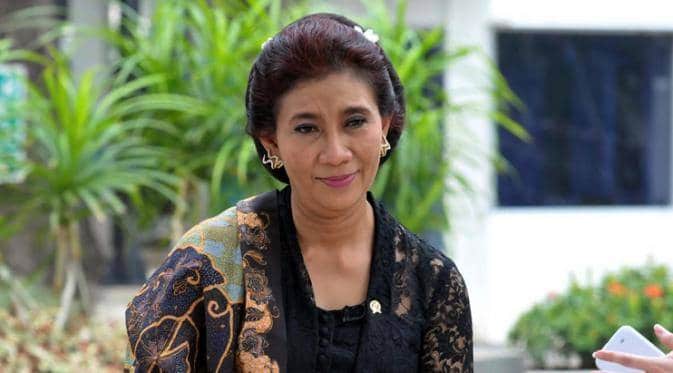
by Maureen | Nov 20, 2014 | 2014, Awareness, Being Thankful, Elections, Eye on Culture, Feminism, Government, Indonesia, Inspirational, Media, News, Politics, Prejudice, Respect, Scoops of Joy, Women's Rights, World Motherhood

Susi Pudjiastuti, Minister of Maritime and Fisheries
Big changes are taking place in Indonesia lately with the new President Joko Widodo (or as we Indonesians lovingly call him, Jokowi) taking office last month.
Six days after he took office, Jokowi announced his cabinet lineup to the public. Eight women out of a total of 34 have been elected as ministers. It was the highest number of female cabinet ministers that has ever been elected in our country’s history and demonstrates Jokowi’s courage in giving women an opportunity.
Gender equality opportunity seems to have a brighter future with this cabinet lineup.
One of the women ministers that has been elected is Susi Pudjiastuti. She was elected as Minister of Maritime and Fisheries.
The media have been talking about Susi all of a sudden. She even became a trending topic on Twitter. Her election as a minister created a big controversy here.
She was not someone that came from any political affiliate. She is a bit different compared with some other women in world politics, like Hillary Clinton or Angela Merkel; she is a business woman. She smokes, she doesn’t have a PhD or any prestigious titles lined up behind her name – she actually dropped out of high school and unlike some others, she didn’t drop out of school because she was poor, it was actually because she felt she wasn’t happy even when she was reportedly a bright student. She decided to follow her own path at the tender age of 17.
With roughly $75, she started her first entrepreneurship in Pangandaran, Central Java with a fishery business. In 1996 she formed her own company called PT. ASI Pudjiastuti Marine Product. After her business expanded throughout Asia and America, she realized she needed a fast and reliable way to transport the seafood products to the buyers. Then Susi Air was born. She built her own aviation company even obtaining her own pilot license. Her airline now serves publicly in many remote parts of Indonesia.
Sadly, the media coverage she received was not because of her achievements or the many awards she has received over the years. The media coverage arose because she has tattoos, because she smokes, is a social drinker and a single mom, formerly married to Caucasian men twice.
Her detractors started judging her personal life, discrediting her ability to hold her role as a minister while she jumped head first into her new job in the government and making the necessary changes.
Among the negative comments however there also has been a lot of support for Susi. I am one of those big supporters.
In my eyes, I see a strong woman, someone very capable and who seems to have a strong character and is very intelligent despite her lack of a college education. Being a successful, independent single mother will really inspire other single mothers in Indonesia. We now have the first single mother minister in the history of Indonesia.
For the Indonesian patriarchy system, this feels like a big breakthrough and already she is busy working hard to fix the maritime and fisheries industry. Jokowi believes in her and that she has what it takes to get the job done and to create breakthroughs.
Jokowi is leading the way by giving Susi Pudjiastuti and the rest of the women minister an opportunity to take important roles in the government.
I salute all of these women and wish them all the best in their new roles.
There are many women involved in politics worldwide these days. Do any female politicians inspire you? What do you think of the increased number of women’s involved in politics?
This is an original post to World Moms Blog from our writer and mother of one in Indonesia, Maureen.
The image used in this post is from Susi Pudjiastuti’s public Facebook page. You can view more images of the politician here.

by Purnima Ramakrishnan | Oct 11, 2014 | 2014, Feminism, Girl Child, Human Rights, Humanity, India, Inspirational, Maternal Health, Purnima, School, Sex, Sexuality, Social Equality, Social Good, The Advocates of Human Rights, The Alchemist, United Nations, Women's Rights, World Events, World Interviews, World Mom Feature, World Moms Blog, World Motherhood, World Tour, World Voice
In celebration of International Day of the Girl, our Senior Editor in India, Purnima Ramakrishnan, interviewed the heads of a very special school in India. What she learned and felt was nothing short of amazing…
I was ushered in, inside the Vice-Principal’s room when I expressed my desire to interview both, the VP and the Head-Mistress. It was a completely relaxed chat, and I was so surprised about the open-door policy embraced by this school for all its teachers and students. All my prepared interview questions flew out of my head as they talked about the school, the students and their passion for teaching.
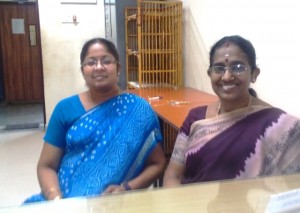
Mrs. Bhavani Baskar, The Vice-Principal (left) and Mrs. Jayashree Subramanian, Head-Mistress (right) of the PSBB Millennium School
During the chat, I observed so many students and teachers, and other staff members of the school, knocking and walking in with something or the other which needed either the Vice Principal’s or Head mistress’ intervention. No, you don’t need any appointment to go and say ‘Hello’ to them. None of the students did.
And as we proceeded to chat, I became more surprised and awed at the way they addressed students on a first name basis, from various grades who had popped in for a chat. Who could remember so many names? They did!
It has been a great pleasure to chat with Mrs. Bhavani Baskar, The Vice Principal and Mrs. Jayashree Subramanian, the head Mistress of PSBB Millennium School in Chennai, India. They spoke about their teaching journey, their vision for girls and boys in the school and the murals. It was the murals which sparked my curiosity and led me into their doorway. I included picture of them throughout the interview below, and I hope you find them as beautiful, as I did! Now on to the interview…
What inspired the murals? Who did them?
Initially, we got a palm imprint from all the girls of the school to say, “I am proud of being a girl.” The boys of the school wanted to join, too, to say, “We respect you.” This was done to celebrate the “Day of the Girl Child.”
These murals were an extension of the same theme.
The senior students were encouraged to paint the walls sharing their thoughts on being a girl, and the boys also joined, to express how they felt about their girl-classmates. The result was the lovely messages that came across on the walls.

Mother Earth Needs Her Daughters
What was the effect of the murals?
They are receiving a lot of attention. The occurrences of boys teasing girls has reduced considerably. Bullying is also greatly reduced. Respect between the genders has increased. The general attitude has improved.
These murals are painted at the backdrop of the playground, and all the children at some point in time look at them at least once a day. And whether they want to or not, they have to acknowledge their presence consciously or subconsciously. Children right from grade 1 to 12 share the playground and so they would look at them. They would talk about them. And it would create an impact as to how girls are viewed.
The murals affect the thought process of both the boys and girls as they grow up. Boys would respect girls and girls would grow up to be secure, and confident in this society.
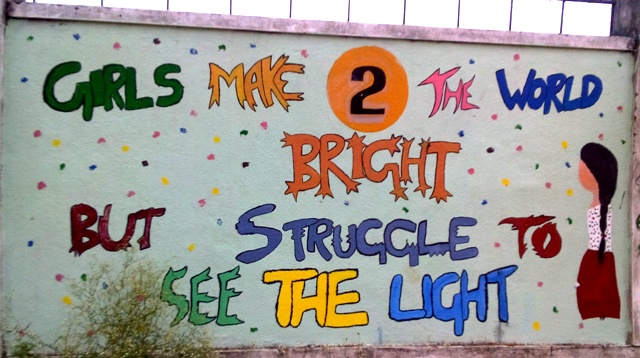
Girls Make The World Bright, But Struggle To See The Light
What is the % of boys and girls in the school?
Boys beat girls by being 54% and girls are 46%. But this is still a great ratio for the state where female infanticide is rampant in the rural areas.

Let Me See The World
Can you comment about the performance of the girls and boys in the school?
Girls always out-beat boys! They are more sincere, they are meticulous in their planning and definitely more hardworking.

Do Not Let My Life End
They also spoke about their respective personal teaching career and their journey in the school. Mrs. Bhavani Baskar, the Vice Principal joined as a Mathematics teacher and now in addition to her duties as a Vice Principal, she continues teaching Mathematics for Grade 12. She is also the HOD for the Math department. She has more than 20 years of teaching experience in mathematics, and she is passionate about it.
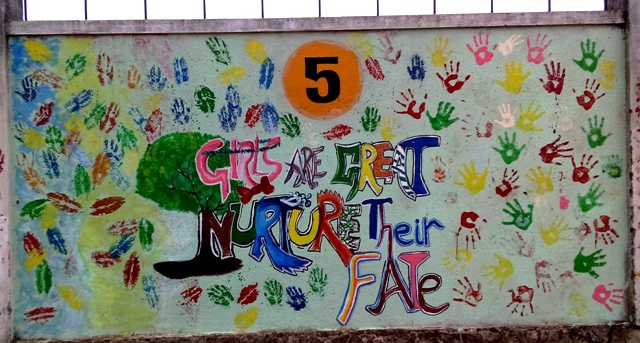
Girls Are Great, Nurture Their Fate
Mrs. Jayashree Subramanian, the Head Mistress is also the HOD of the Social Science department. She also manages dual responsibilities and says she would never trade the joy she finds in teaching for anything. When I asked about her retirement, she says, she is a grandmother, too, and would love to go and spend time with her grandchild. But she feels strongly attached to the school, the children, and even to the principal.

A Girl Child Today, A Mother One Day
The Principal of the PSBB Millennium School, Mrs. Sita Uma Maheswaran also had a few words for World Moms Blog in spite of her very busy schedule. The below conversation is from the Principal.
Do you feel like there is a true cultural shift taking place to recognize the importance of the girl child?
On one hand, we Indians, have so many woman deities being worshipped as God. On the other hand, we still have women and young girls being gang raped.
There is a lot of talk happening about justice and equality but it us yet to reach the rural level. Urban girls are more enthused, and they do pride in their being a woman and appreciating girls. But it is a known fact that there are certain cities where women fear to step out.

Girls Are Great, learn To Appreciate Them
What is the main factor driving this force?
Attitude among men is the main factor, irrespective of whether they are educated or not. The way they have been brought up with values in life, the way they have seen their mother or sister being treated – this can have a great effect!
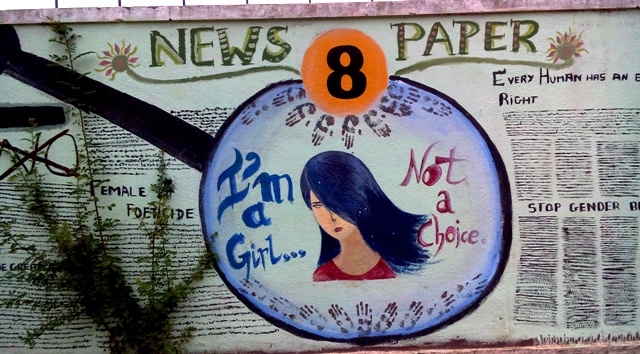
I Am A Girl, Not A Choice
How do you think these murals are affecting the thought process of girls and boys in the school?
There is respect which is breeding unknowingly for the girls, from the side of the boys. They realize that girls are to be respected and appreciated.

Give Girls The Wings To Fly
What was your journey like to become the principal of such a prestigious school?
I began as a Teacher Trainee in PSBB Senior Secondary School in 1986. It has been a roller coaster ride since then. There have been many a thrilling moments and a lot of learning. It is but natural when you get to work under some one like Dr Mrs Y G Parthasarathy, The Dean and Director of the school. Becoming Principal was a lot of responsibility. The work is more challenging. My perspectives have changed, too, because of the broader outlook. I work with more people now, and the goals that I set for myself are different, too.

Girl Child – The Greatest Gift To Mankind
What is your one wish for girls in your school and all over the world?
Mrs. Jayashree Subramanian, the Head-Mistress said, ” I want girls in my school and all over the world to have self-respect, self-esteem and know that they are powerful. I want to teach the girls in my school to face the challenging world with confidence and courage and know that they can be whatever they aspire you to.”

K(no)w Mother, K(no)w Daughter, K(no)w Life
Mrs. Bhavani Baskar, The Vice Principal said, “I want to teach my girls courage, valor and self-esteem. The great South Indian poet Bharathi said, “It is a great blessing to be born as a human, and even greater honor and privilege to be born as a woman.” I want my girls to realize that. I want my girls to be mothers, sisters, daughters and to be an embodiment of love for this entire race.”
There were a few other teachers too who shared their wish for girls everywhere.

Girls Education Can Change The World

Mrs. Mukhtar Tahsin Fathima, 3 – grade teacher
Mrs. Mukhtar Tahsin Fathima, the third grade teacher said, “I want all girls to have awareness about sexual education. I want them to know and be able to protect themselves under any untoward circumstances. I want little children, both, boys and girls, to be given adequate sexual education, and the ability to take care of themselves and seek help when they need it. They should also let down their reservations, shyness and taboo and come out and speak and discuss and be aware of things.”

Mrs. Deepa Seshadri, English Teacher
Mrs. Deepa Seshadri, the English teacher said, “I want my girls to be able to wear and talk what they feel like. They should have the freedom to be natural and happy. They should not have to live in a world where any spontaneous or innocent act is misconstrued in a wrong way. My girls as well as boy students should be able to live in a world which is liberated from prejudice of gender-related actions.”

Mrs. Banu, Kindergarten Teacher
Mrs. Banu the Kindergarten teacher said, “I want equality for all my students. When gender equality is ensured, everything else follows. Education of girl-child, empowerment of women, better living conditions for girls and women and many such issues are resolved.
Girls have a say in everything happening with them. They are independent, and they get to decide what they want to do with their lives. I have brought up my daughter, instilling that she is equal or better than just about any of her counterparts. Every mother and teacher need to do the same with their children. “
The Principal of the school, Mrs. Sita Umamaheswaran said, “I want my girls to know they are no less than any boy or man. To dream big, and set goals that they can work toward. Enjoy womanhood and be in a world that respects women and safeguards them.”
The students of this school have expressed their wish for girls across the world, through these hand-painted, beautiful and striking murals.
What is your wish for the Girl-Child across the world?
This is an original post from our World Mom and Senior Editor in India, Purnima Ramakrishnan on the occasion of the “#DayOfTheGirl Child.”
Her contributions to the World Moms Blog can be found here. She also rambles at The Alchemist’s Blog.
Photo credit for the murals, to the PSBB Millennium School.

 I grew up in a family full of dynamic, resourceful, and strong women. My grandmothers were both widowed and had to raise their children (one had 6 children, the other 9) with nothing but agricultural produce and handcrafts. My mother and aunts displayed the same tenacity in their lives, and I witnessed similar characteristics in other women in my neighborhood and social circles.
I grew up in a family full of dynamic, resourceful, and strong women. My grandmothers were both widowed and had to raise their children (one had 6 children, the other 9) with nothing but agricultural produce and handcrafts. My mother and aunts displayed the same tenacity in their lives, and I witnessed similar characteristics in other women in my neighborhood and social circles.


































